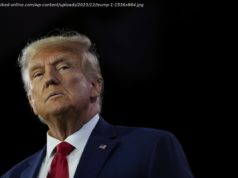We’re finally getting a look at a Republican memo about secret surveillance. Why is it so controversial, and what does it really tell us?
For weeks, it has sometimes seemed that the only thing people in Washington were talking about was a classified memo that almost no one was actually allowed to read.
Now that it’s public, it’s time to break down what this controversial document is all about.
The memo was written by staff working for Rep. Devin Nunes (R-Tulare), who chairs the House Intelligence Committee and is one of President Trump’s closest allies in Congress. With the support of House Speaker Paul D. Ryan (R-Wis.), Nunes spent months demanding sensitive records from the FBI and the Justice Department, including the highly classified evidence used to support a warrant application to the Foreign Intelligence Surveillance Court. The Nunes team then wrote a four-page memo summarizing what they thought were the most important problems with the process. Democrats on the committee did not have any input into the report, nor did many of Nunes’ Republican colleagues.
Not much. The memo focuses on government surveillance, approved by the Foreign Intelligence Surveillance Court, of Carter Page, who served as a foreign policy advisor to the Trump campaign. The first application for a warrant came in October 2016, after Page had left the campaign amid questions about his contacts with Russian officials. Page has not been charged with a crime, and has accused the government of improperly eavesdropping on him.
But the memo confirms that another Trump aide, George Papadopoulos, “triggered the opening” of the investigation that is now headed by special counsel Robert S. Mueller III into whether Trump or his aides assisted Russian meddling in the election. Papadopoulos reportedly confided to an Australian diplomat in July 2016 that Russian intelligence officials had obtained Democratic Party emails, and the diplomat passed the warning to the FBI. Papadopoulos pleaded guilty last October to lying to the FBI about his contacts with Russian officials and is cooperating with Mueller’s team.
Nunes steps aside from leading his committee’s Russia investigation amid an ethics controversy over whether he inappropriately disclosed classified information.
Despite stepping back from the Russia case, Nunes is probing how law enforcement have handled their investigation. He subpoenas records from the Justice Department.
Nunes is cleared by the House Ethics Committee.
Chris Wray and Rod Rosenstein appeal to Paul Ryan to avoid turning over some sensitive records to Nunes, but Ryan backs up Nunes.
House Intelligence Committee votes to make the memo privately available to every member of the House.
House Intelligence Committee votes to release the memo, sending it to the White House for review.
Trump is caught on a hot mic saying he « 100% » wants to release the memo even though administration officials said he hadn’t read it yet.
The FBI publicly says it has « grave concerns » with the accuracy of the memo.
A senior administration official says Trump will give the green light for the House to release the memo.
The House Intelligence Committee is using a process that experts say has never been used before. After allowing all members of the House the opportunity to read the secret document — about 200 reportedly did — the committee voted along party lines to send it to the White House. Trump had five days to object to its release, but he declassified it on Friday. The committee also voted on party lines to block the simultaneous release of a Democratic rebuttal, saying it needs to go through the same process.
Before the memo became public, there was a steady drumbeat of dark statements about its contents. Fox News host Sean Hannity said “this makes Watergate look like stealing a Snickers bar from your local candy store.” After releasing the memo, Nunes said his research had “discovered serious violations of the public trust.”
The basic thrust of their concerns is this: When the Justice Department asked the Foreign Intelligence Surveillance Court, also known as the FISA court, for a surveillance warrant on Page, some of the information to back up the request came from Christopher Steele, a former British spy who was a longtime FBI source. At the time, Steele was working for Fusion GPS, a research firm that had been hired first by anti-Trump Republicans and later by Democrats to collect opposition research on Trump. The source of Steele’s funding was not disclosed to the court, according to the memo.
It’s hard to tell how important Steele’s research was to obtain the warrant, or if the secret court would have rejected the application had they known more about him. Instead, they reauthorized it three separate times, each time by a different judge. Classified applications to the surveillance court normally are 50 or 60 pages, while the Republican memo is only four. « You need to know the totality of what’s in the affidavit to know if it’s relevant,” said Orin Kerr, a USC law professor and an expert in criminal procedure.
There’s also a question about whether the identify of Fusion GPS’ client is relevant. It’s not unusual for law enforcement to field tips from politically motivated sources. « The FBI gets information from mobsters and terrorists on a regular basis,” said Benjamin Wittes, a senior fellow at the Brookings Institution . “It seems a little peculiar to suggest they can’t get it from Democrats.”
Like so many other things about the memo, this is hotly contested. The document references — but does not directly quote — closed-door testimony from Andrew McCabe, who recently stepped down as the FBI’s deputy director. « No surveillance warrant would have been sought from the [FISA court] without the Steele dossier information,” the memo says. Republicans have pointed to this line as proof that Democratic-funded research was a key part of the case.
McCabe’s full testimony remains classified, so it’s impossible to independently judge the memo’s accuracy. Rep. Adam B. Schiff (D-Burbank), the ranking member on the House Intelligence Committee, said the memo takes McCabe’s comments out of context. It’s also possible that the dossier piqued the FBI’s interest in Page but wasn’t crucial to establishing probable cause to conduct surveillance.
Democrats have described the memo as misleading and inaccurate, a smokescreen to give Trump political talking points to undermine the criminal investigation. House Minority Leader Nancy Pelosi (D-San Francisco) said Nunes should be stripped of his committee chairmanship. Schiff said Republicans were trying to “circle the wagons around the White House and distract from the Russia probe.” Republicans not only blocked simultaneous release of the Democratic response, they refused to let FBI Director Christopher A.
Home
United States
USA — Science Here's what you need to know about the Republican memo everyone is...






